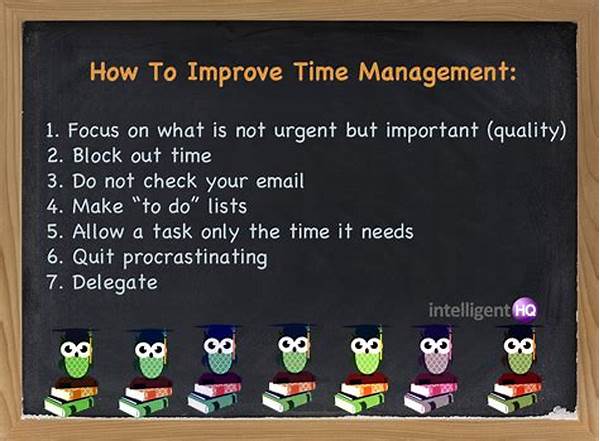Time management is an essential skill that many strive to master but few truly achieve. In our fast-paced world, it’s easy to feel overwhelmed by the myriad tasks and responsibilities that demand our attention. Have you ever found yourself asking, “Where did the day go?” or felt the mounting pressure as deadlines loom? If so, you’re not alone. The secret lies in not just managing your time, but improving your time management skills to gain more control over your life.
Read More : Time Management Tools
Understanding how to improve time management can dramatically transform your productivity and overall well-being. Imagine a world where you have more time for the things you love, could meet every deadline with ease, and still find moments for rest and relaxation. It almost sounds like a fairytale, but with the right strategies, this can become your reality.
Let’s dive into the core of effective time management. Focus is key. In an era where distractions are aplenty, honing your ability to concentrate is a superpower. Our smartphones, social media, and even well-meaning colleagues can pull us away from important tasks. Identifying and minimizing these distractions are vital steps to improving your time management.
Another crucial element is prioritization. Not all tasks hold the same weight. By discerning what truly matters, you can direct your energy toward impactful activities that align with your goals. This alignment ensures that your efforts translate into significant achievements and personal satisfaction.
Yet, the journey to mastering time management isn’t just about cutting out the unnecessary. It’s also about embracing tools and techniques designed to streamline your processes. From digital productivity apps to tried-and-true methods like the Pomodoro Technique, finding the right fit for your personality and lifestyle can pave the way for successful outcomes.
As we move forward, consider this article your guide—a beacon toward not only achieving but excelling in your time management endeavors. Prepare to embark on a journey filled with strategies, stories, and solutions that will leave you with more time to conquer your day, every day.
The Art of Prioritization
Prioritization is the bedrock of effective time management. It’s the golden ticket for anyone serious about how to improve time management. Think of it as the compass that keeps your journey aligned with your ultimate destination. Without it, even the most diligent timekeepers can find themselves drifting off course.
Incorporating these insights into daily life forms the core of how to improve time management. Now, armed with practical tactics and a newfound perspective, you have the power to reclaim your time and maximize its potential.
—
Five Key Steps to Improve Time Management Skills
Mastering the craft of time management demands not just knowledge but a strategic application of that knowledge. It’s a skill that evolves continuously with practice, adaptation, and evaluation. Below is a structured guide to help you navigate through this journey effectively.
Understanding the Importance of Time Management
First, recognize the significance of time management. It’s more than just allocating hours to tasks; it’s about optimizing those hours for maximum productivity and personal satisfaction. When you learn how to improve time management, you gain a clearer vision of your objectives and a structured pathway to achieve them.
Statistical Insights: Study after study emphasizes that efficient time managers tend to achieve higher success rates in their personal and professional lives. According to recent data, individuals who harness their time effectively report being 70% more satisfied with their work-life balance.
Schedule and Plan Meticulously
Second, take a meticulous approach to scheduling and planning. A well-thought-out plan is akin to a roadmap leading you to your destination. Utilize digital tools or traditional agendas—whichever fits your style—and outline your tasks. Segment your day into blocks, assigning specific tasks to each block, and stick to this routine.
Leveraging Technology for Better Time Management
Third, technology can be your best ally when learning how to improve time management. Applications like Trello, Notion, or Asana offer powerful platforms to organize and track your tasks. These tools provide both a bird’s-eye view and a detailed insight into your workflow, enhancing your management prowess.
Adaptation and Flexibility: While planning is crucial, remaining adaptable is equally important. Life is unpredictable, and learning to pivot without losing your stride is a pivotal time management skill.
Importance of Delegating Tasks
Fourth, don’t hesitate to delegate when necessary. The narrative that one must handle everything is a myth. Delegation doesn’t dilute your control; instead, it amplifies your efficiency by allowing you to focus on high-priority tasks that truly require your expertise.
Emotional Insight: Sharing responsibilities can reduce stress and provide others with development opportunities—an emotionally intelligent approach to improving time management.
Continuous Evaluation and Feedback
Finally, commit to continuous evaluation and feedback. Regularly assess your strategies, progress, and areas for improvement. Feedback, whether self-imposed or external, is instrumental in honing your approach.
In conclusion, learning how to improve time management is not an overnight transformation but a gradual evolution. With discipline, dedication, and an openness to adapt, anyone can cultivate the art of time management and witness its transformative impact on life.
—
Key Takeaways for Improving Time Management
Time is a finite resource, and mastering how to improve time management can have profound implications for both your work and personal life. Here are seven takeaways to guide you on this journey:
Equipping yourself with these strategies can revolutionize your approach to daily responsibilities, granting you more control and satisfaction from your time.
—
Unlocking Your Potential: How Time Management Transforms Lives
Time management might seem like a mundane topic at first glance, but its significance cannot be overstated. It is the underpinning of success, efficiency, and satisfaction in all endeavors. As we look into how to improve time management, it’s essential to explore the profound effects it has on the quality of life.
The Transformative Power of Time Management
Effective time management transforms lives by providing structure, clarity, and purpose. Imagine having an additional hour in your busy day—a reality when you manage your time effectively. This efficiency allows you more freedom to pursue passions, spend time with loved ones, or even pick up a new hobby.
Tailoring Strategies to Fit Personal Needs
Not all time management strategies are one-size-fits-all. Discovering how to improve time management involves tailoring techniques to your personal style. For example, while some thrive on digital apps, others find solace in traditional calendaring. It’s about finding what best aligns with your needs and sticking to it.
Why Embracing Flexibility Matters
Sticking rigidly to schedules can be counterproductive, leading to frustration when plans go awry. Embracing flexibility without losing focus is crucial for navigating unforeseen changes, ensuring a balanced and adaptive approach to time management.
The Role of Mindfulness in Effective Time Management
Incorporating mindfulness into your routine can further enhance time management. Being present allows you to engage more meaningfully with tasks at hand, increasing both the quality and speed of your work.
Crafting a Reward System
Finally, introducing a reward system for managing tasks efficiently can encourage consistency and perseverance. This positive reinforcement can be a powerful motivator in maintaining effective time management practices.
Simple Steps to Enhance Time Management
For those eager to learn how to improve time management, here is a concise plan:
1. Define Goals Clearly: Be clear about what you’re working towards.
2. Prioritize Tasks Daily: Begin each day focused on high-priority tasks.
3. Eliminate Multitasking: Concentrate on one task at a time to ensure quality.
4. Use Time Tracking: Monitor how you spend your day to identify areas for improvement.
5. Set Boundaries: Ensure work-life balance by establishing clear boundaries.
6. Regular Breaks: Take frequent but controlled breaks to maintain peak productivity.
7. Fine-tune Your Process: Regularly reassess and refine your approach for continuous improvement.
Understand that improving your time management skills isn’t about packing more into each day but optimizing how that time is utilized. With dedication, patience, and consistent application of these principles, you can unlock your potential and enjoy a more fulfilling, less stressful life.


